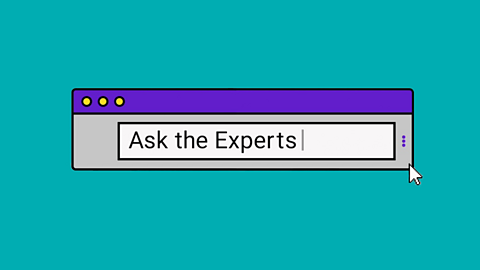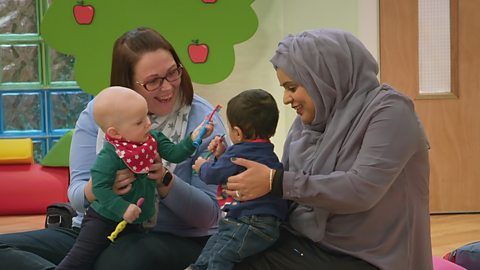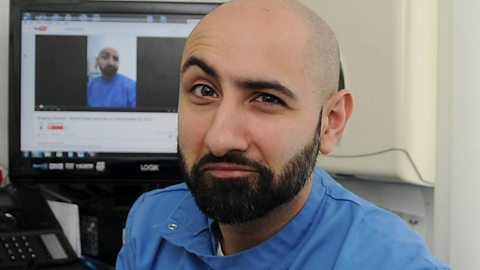
When to start brushing, how to cope with resistance, fears of the dentist… Parents often have lots of burning questions about how to look after children's teeth. We got social media's favourite dentist Dr Milad Shadrooh aka The Singing Dentist to answer some of our Instagram followers' concerns.


When should you start brushing children's teeth?
You should start brushing children's teeth as soon as they appear. As soon as you can see one in there, that's when you should be cleaning it.
Now, you don't have to use a toothbrush. You could even use your finger wrapped in a bit of gauze and you want to get a tiny smear of age-appropriate toothpaste. And you just wipe it onto the tooth.
How long do you need to do it for? As long as it takes to just cover the tooth with a bit of toothpaste. That's what it's about, getting some protection onto the teeth, children getting used to having their teeth touched. And even before the tooth comes through, it's not a bad idea to massage the gums as well, because it gets the little one used to having their gums touched.
And there are some really good baby pastes out there as well that have some soothing gels in there that can help with teething.
How can I encourage my child to brush their teeth?
Success with brushing in the early years is all about making it fun, so try to brush children's teeth at a time they're most happy or when they're playing and distracted. For us, it was super useful doing it in the bath, because we were cleaning their whole body, so let's clean their teeth as well. And it doesn't matter how much mess you make!
Other things you can try include getting them to brush your teeth for as long as you can brush their teeth. There's a bit of distraction there - they're so concentrated on cleaning yours, you can get in there and give theirs a good clean.
It's really important to supervise brushing up until the age of 7, but actually you should be doing it up until about age 4. That's when they really learn to control the toothbrush and you can let them have a go, but then you can go back over it yourself.
Another thing to try may be cleaning their favourite toy's teeth. Again, it's a bit of distraction that makes it a bit more playful.
The last thing is to maybe make the mouth an adventurous place. So for example, it could be a house, so 'let's clean upstairs', 'let's clean downstairs', 'let's clean the back garden' as you focus on different parts of the mouth.
So it's about making it fun, a bit of distraction and lots of positive reinforcement after they've done a good job.
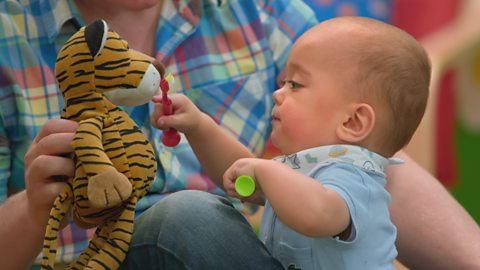
How can I help a child with sensory needs with brushing their teeth?
Children with sensory issues tend to struggle with a couple of things.
The first is the brush itself and the feeling of the bristles touching their teeth. You could just use your finger wrapped in a bit of gauze or you could get silicon brushes. They just don't have the same feeling against the teeth. Even teething brushes can be useful.
The second element is the toothpaste. And quite often it's either the flavour or it foaming up. It can be both. You can get flavourless toothpaste, so the strong minty flavour doesn't affect children. And the second element, the foaming agent, is called SLS - sodium lauryl sulphate - it's in quite a lot of things like shower gels, shampoos etc. So if you can get a toothpaste without SLS, it doesn't have that foaming effect, so children can find it more comfortable to use.
Why are my child's teeth discoloured? What can I do about it?
Marks on the teeth and discolourations can occur - white spots on the teeth tend to be the most common thing we see. They could indicate one of two things:
It could be a sign of early tooth decay. So it's really important to keep that area clean, use a good fluoride toothpaste and mention it to your dentist.
Or it could actually mean there's a bit too much fluoride. You can get small spots, which we call fluorosis. Again, mention it to your dentist, make sure you're keeping the area really, really clean and use a small smear of toothpaste so your child isn't swallowing loads of fluoride.
Discolourations can be due to food. It could also be due to bacteria. Plaque can also appear as white staining - that tends to be towards the gum.
Finally, a thing to look out for is greying of the teeth. If all the teeth have a slightly grey tinge to them, that could just be the natural colour of the teeth. However if one tooth looks more grey than the teeth next to it, that could indicate that the tooth has had a bit of trauma. So again, mention that to your dentist.
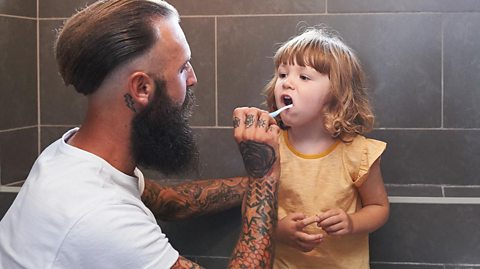
My child's teeth are crooked. What can I do about it?
Gaps in baby teeth or teeth coming through crooked isn't really anything to worry about. It's not something we would treat and you may even see some resolution as they grow and their jaw expands.
It also doesn't mean that their adult teeth are going to have gaps or be crooked.
However, one thing that can affect adult teeth is early loss of baby teeth, through trauma for example.
Basically, adult teeth use baby teeth as a guide for where they're coming. If you lose the baby tooth early, the adult tooth kind of loses its sat nav. It may get delayed coming through and also might come out in a slightly wrong position. These are things that we can deal with later on.
Another thing you can get is some swelling around the gums before the teeth come through. It's nothing to worry about and will resolve once the teeth have come through.
I'm worried my child has a lip tie. What can I do?
Your little one having a lip tie isn't really something I'd be worried about. What we mean by 'lip tie' is that little bit of skin that goes from under your lip to your gum.
It can be an issue a bit later on in life, because it can cause a gap between your teeth. If you're going to have braces to close the gap, then you're going to have to do something with the lip tie. But more often than not, with little ones it sort of tears back bit by bit by itself.
So it's not something I'd be worried with - it doesn't affect their speech development and it doesn't affect feeding.
Should I be worried that my child is grinding their teeth?
Children grinding their teeth is relatively common. Although it's quite disconcerting and can be really loud, it isn't something we'd usually treat. We do treat grinding later on in life as it can lead to issues, but in little ones it usually resolves itself.
What can I do if my child is scared of going to the dentist?
Fear of the dentist isn't something we're born with. We learn most fears from bad experiences or from our parents or from our peers.
So the first thing is to make sure you take your children to the dentist as early as possible so they can see that it's not a scary place to be. Now I appreciate that is a bit more difficult with covid and the restrictions on attendance, but please persevere and try and take your children as early as possible. We actually encourage children to attend even before the age of one. That's not necessarily for us to look in their mouth but for them to get used to the sights, sounds and smells of a clinic. And also it gives us an opportunity to give you some advice.
The next thing to do is actually practise with your child what it's like going to the dentist. So, opening your mouth, having your teeth counted out or even lying down flat with your mouth open. These are all strange things for your child to do, so you can practise those at home.
Another thing is, whatever cartoon your child likes, you can guarantee there's a dental episode of it. So get them to watch that and get a feel for what it's like in a clinic.
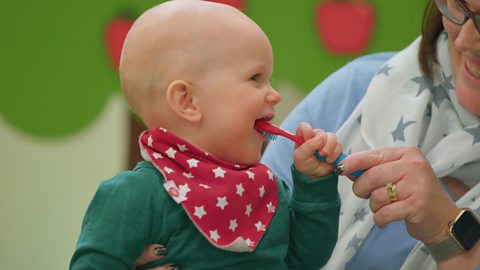
How does breastfeeding affect my child's teeth?
When it comes to breastfeeding and looking after your children's teeth, there's no evidence to suggest that breastfeeding increases the chance of tooth decay in children.
So my advice is, before the night-time routine, give the teeth a good clean. Make sure there's a good amount of fluoride toothpaste that comes in contact with the teeth because that will give the teeth some protection. And then go about your night-time feeding routine.
People always ask me 'after my baby's been fed, should I wake them up and brush their teeth again?' and the answer is absolutely not - we all know you don't wake a sleeping baby! It's fine - there'll be some protection still from the fluoride toothpaste and hopefully your little one can have a lovely night's sleep and so can you.

